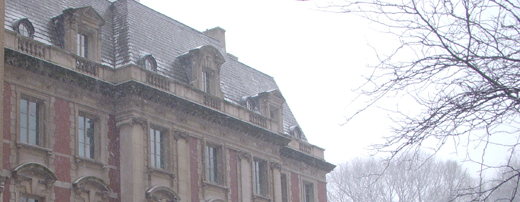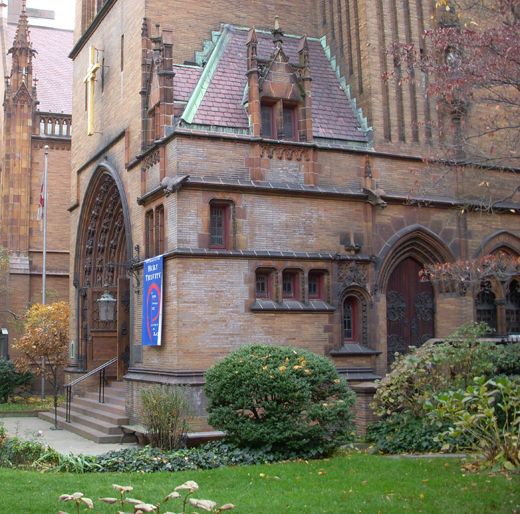Daily Office: Wednesday
Wednesday, February 18th, 2009¶ Matins: For what it’s worth, I support the mortgage bailout that President Obama is expected to unveil in Phoenix later today. Helping those who can’t afford to pay their mortgages is the right thing to do. Helping homeowners whose mortgages are simply “underwater” — worth more than the home’s likely sales price — is a different problem that ought to be addressed in some other way, and not right now.
¶ Lauds: The whole town’s talking — or so it seems — about Trovatore at the Metropolitan Opera, with the one (1) singer who has ever given me pleasure in an opera house, Sondra Radvanovsky. Steve Smith gave the show such an enthusiastic review that I had to get a ticket.Â
¶ Prime: No Sh*t, Please; We’re British: R*tard Rids Reptile Researcher’s Reserves of Reclusive Retrosaur’s Refuse. Okay, I made up “retrosaur.” But it’s pretty cool as neologisms go, don’t you think? In case you’re wondering what it means, a “retrosaur” is a lizard that everyone thought was extinct — which is what this exceedingly English story is all about.  (via Brainiac)
¶ Tierce: More good news from Washington: stepped-up merger scrutiny, and this time with brains. Rob Cox reports.
But there is a growing movement in the antitrust community to challenge this rational choice theory of neoclassical economics in favor of behavioral economics. Under this school of thought — loudly espoused by Obama’s chief economic adviser, Lawrence H. Summers — economists examine how real people actually make decisions.
Applying behavioral economics to antitrust “risks expanding the scope of agency review to transactions that were previously unassailable,†two lawyers with Skadden Arps, Neal R. Stoll and Shepard Goldfein, wrote in The New York Law Journal last month. It would, among other changes, require the retention of psychologists alongside the economists, marketers and industry experts currently reviewing deals.
¶ Sext: Does anyone remember Lady Fanny of Omaha? (The great Barbara Harris, in Dirty Rotten Scoundrels.) Now we have Robert Allen Stanford, Texan financier and alleged swindler, dubbed Sir Allen by the government of Antigua in gratitude for his benefactions, which ranged from cleaning up the state balance sheets to sponsoring a cricket league. Â
In Texas, Robert Allen Stanford was just another wealthy financier.
But in the breezy money haven of Antigua, he was lord of an influential financial fief, decorated with a knighthood, courted by government officials and basking in the spotlight of sports and charity events on which he generously showered his fortune.
I know that it’s silly, but I already think of him as “Sir Allen of Obama.”
¶ Nones: The crucifix crisis has flared up in Italy again. A teacher has been sacked for removing the (non-compulsory) crucifix from his classroom, and the supreme court has let stand the conviction of Jewish judge who refused to serve in a courtroom adorned with a cross.
¶ Vespers: In a classic case of the deadly short-circuiting that can occur when book publishers have other interests — as, being components in media empires these days, they all do — Brian, at Survival of the Book, comments on Barry Ritholtz’s problems with McGraw-Hill, which didn’t like what he had to say about Standard & Poor’s, a McGraw-Hill property.
It’s also interesting to note yet another example of an author going right online with his case, and with a whole lot of material, to prove his innocence. On this post, he includes revised versions of pieces of the manuscript and footnotes, all of which he has every right to post. He’s making the case the he himself did not expose this story to the media but now that it’s out there, he can explain himself and his position as an author at a massive corporate publisher. As more such cases emerge and more authors speak out and get attention for it, perhaps publishers will work more in partnership with authors rather than seeing them as disposable manufacturers churning out products they depend on. As authors are expected to do more marketing, more publicity, more leg work all around on behalf of their books, then publishers must also know that they are armed with tools to broadcast their complaints.
¶ Compline: Now, this is fun: in a new Pew poll, respondents were asked if they were happy where they lived or if they’d like to move.
Seven-in-ten rural men are content where they are, compared with just half of rural women.
Hmmm . . . how mysterious! (via Snarkmarket)





















